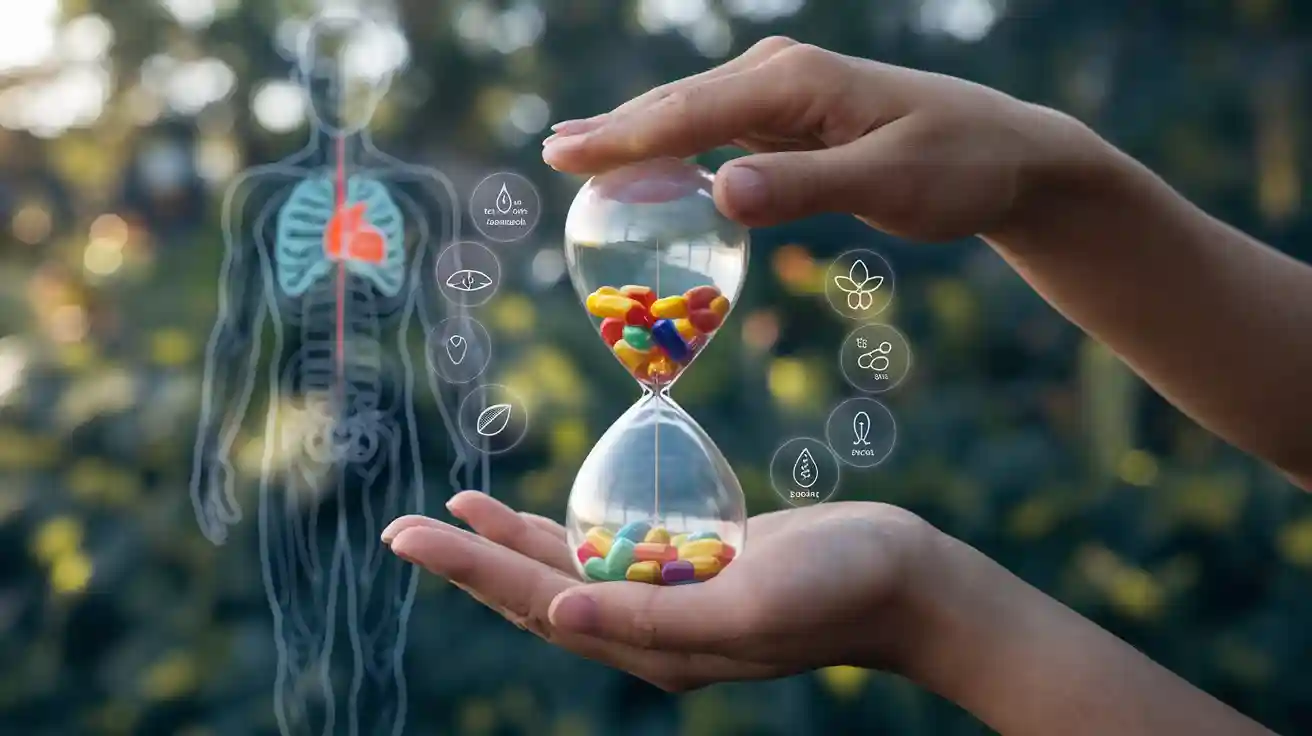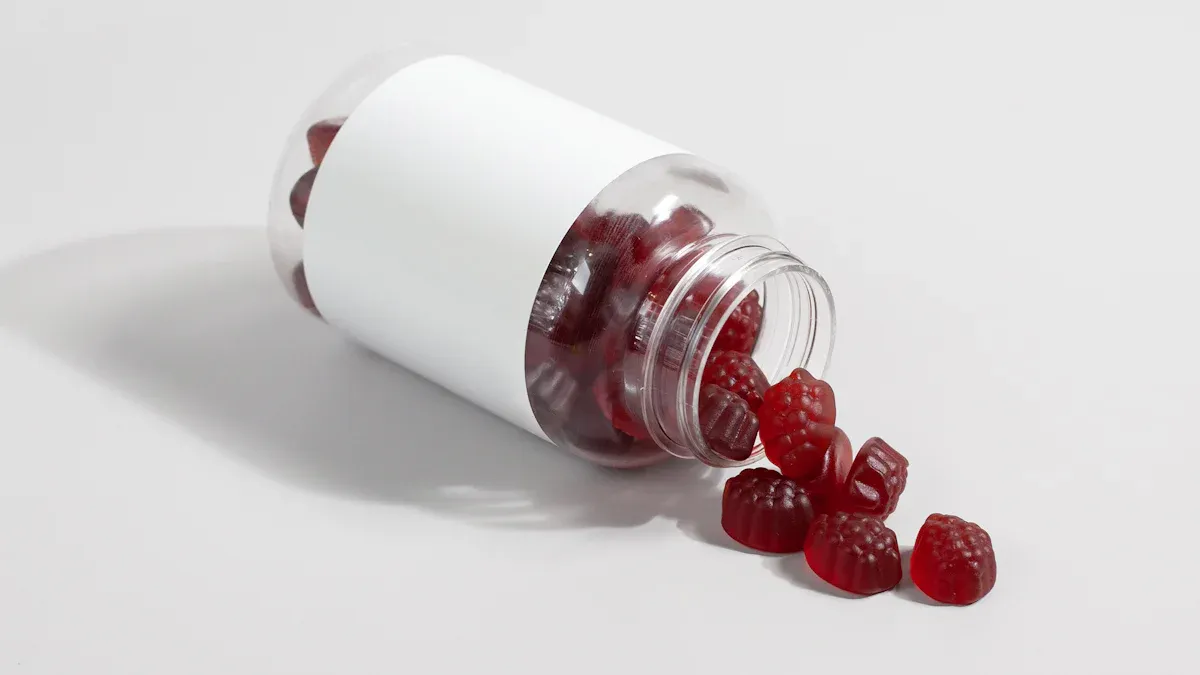Understanding the Timeline for Vitamin Results in Your Body
Table of Contents

You start a new vitamin and wonder, “how long does it take for vitamins to work?” You are not alone. In fact, more than half of adults in the United States take vitamins or supplements. Yet, only about one in five actually has a nutritional deficiency. For most people, it takes anywhere from a few days to a few months to notice a change. If you want to see real benefits, you usually need to stick with your routine for 1-3 months. Water-soluble vitamins, like vitamin C, may work faster. Fat-soluble vitamins, such as vitamin D, often take longer. Understanding the Timeline helps you set clear expectations for your health journey.
Understanding the Timeline
How Long Do Vitamins Take to Work?
You might wonder, “how long do vitamins take to work?” The answer depends on many things, but understanding the timeline can help you set realistic goals. Some people notice changes in their energy or mood after just a few weeks of taking vitamin supplements. Others need several months to see real benefits. This happens because vitamin deficiencies often build up slowly over time, so it takes a while for your body to catch up.
Water-soluble vitamins, like vitamin C and the B vitamins, usually work faster. Your body absorbs these nutrients quickly, and you may feel the benefits in days or weeks. Fat-soluble vitamins, such as vitamins D, A, E, and K, take longer. Your body stores these nutrients in fat, so it can take weeks or even months before you notice any changes.
If you start a new supplement, remember that patience is key. The effectiveness of vitamins grows with steady use and healthy habits.
Factors That Affect the Timeline
Understanding the timeline for vitamin results means looking at what makes the process faster or slower. Here are some important factors:
- Severity of Deficiency: If you have a major vitamin deficiency, it may take longer to see benefits. Your body needs time to rebuild its stores of nutrients.
- Consistency: Taking your vitamins every day helps your body reach and keep healthy levels. Skipping doses can slow down the process.
- Current Vitamin Levels: If your current vitamin levels are already close to normal, you might notice benefits sooner. If your levels are very low, it will take more time.
- Age: Your age changes how your body absorbs and uses nutrients. For example, older adults often have trouble absorbing vitamin B12 and vitamin D. This can make the timeline longer.
Here’s a quick look at how age can affect vitamin absorption:
| Vitamin | Age Group Impact |
|---|---|
| Calcium | Older adults absorb less, which can raise the risk of fractures |
| Vitamin D | Adults over 50 often do not get enough from food or sunlight |
| Vitamin B12 | Older adults may not absorb enough due to digestion changes |
- Diet and Lifestyle: Eating a balanced diet helps your body use vitamin supplements better. Smoking, drinking alcohol, or eating lots of processed foods can slow down vitamin efficacy.
- Current Health: If you have certain health conditions, your body may not absorb nutrients as well. This can change how quickly you see results.
- Nutrition Habits: Good nutrition habits, like eating fruits and vegetables, support the effectiveness of supplements.
Many older adults face vitamin deficiencies, especially in B vitamins and folate. Regular supplements can help improve current vitamin levels and support overall health. If you keep up with your routine, you will likely see benefits over time.
Tip: Track your progress by noting how you feel each week. This can help you spot small changes and stay motivated.
Understanding the timeline for vitamin results means knowing that everyone is different. Your body, your current vitamin levels, and your habits all play a role. Stay consistent, eat well, and give your body time to enjoy the benefits of good nutrition.
How Vitamins Work in the Body

Absorption Process
When you take a vitamin, your body starts working right away to break it down and use it. Most vitamin absorption happens in your small intestine. Here’s how the process works:
- Your stomach breaks down food and releases vitamins.
- The small intestine absorbs most vitamins. Water-soluble vitamins, like vitamin C and B vitamins, use special transport systems to enter your cells.
- Some water-soluble vitamins even come from helpful microbes in your large intestine.
- Fat-soluble vitamins, such as A, D, E, and K, need fat to be absorbed. They join with fats in your food to form tiny droplets called micelles. These micelles help the vitamins move into your cells.
Tip: Eating a little healthy fat with your meal can boost the bioavailability of a vitamin, especially for fat-soluble types.
The bioavailability of a vitamin means how much your body can actually use after digestion. Good digestion and a healthy gut help your body get the most from each vitamin.
Water-Soluble vs. Fat-Soluble Vitamins
Water-soluble and fat-soluble vitamins act differently in your body. Water-soluble vitamins dissolve in water and move straight into your bloodstream. Your body does not store them, so you need to get them from your diet every day. Any extra leaves your body through urine. Fat-soluble vitamins dissolve in fat and need dietary fat for proper absorption. Your body stores these vitamins in your liver and fatty tissues, so you do not need them as often.
Here’s a quick table to show the main differences:
| Category | Water-Soluble Vitamins | Fat-Soluble Vitamins |
|---|---|---|
| Storage | Not stored; excess leaves in urine | Stored in liver and fatty tissue |
| Absorption | Directly into bloodstream with water | With dietary fat, stored for later use |
| Toxicity | Low risk | Higher risk if taken in excess |
| Intake Needs | Daily | Less frequent |
| Importance | Energy, metabolism, immune support | Vision, bones, skin, immune health |
Water-soluble vitamins leave your body in just a day or two, so you need to keep your levels up. Fat-soluble vitamins can stay in your body for weeks or even months. The bioavailability of a vitamin depends on how well your body absorbs it and how you eat. For example, eating fat with your meal helps your body absorb vitamins A, D, E, and K better.
Remember, vitamin absorption is not the same for everyone. Your age, health, and what you eat all play a part.
Timeline for Common Vitamins
Vitamin C
You might notice the effects of vitamin C pretty quickly. Most people start to feel a difference within 2 to 4 weeks after starting vitamin supplements with vitamin C. You may see your immune system get stronger or your skin look brighter. If you have a big deficiency, it could take a bit longer. Vitamin C is water-soluble, so your body uses it fast and does not store much. If you eat fruits and vegetables every day, you help your body keep healthy levels of this vitamin.
Vitamin B12
Vitamin B12 works a bit differently. Some people feel more energy in just a few weeks, but others need a few months to notice a change. The supplement effects timeline for vitamin B12 depends on how you take it and your health. For example, if you get shots, you may see results faster than with pills. Health conditions like malabsorption can slow things down, especially for older adults.
Here’s a table to show what can affect your vitamin B12 results:
| Factor | Description |
|---|---|
| Method of Administration | Shots work faster for people who cannot absorb B12 well. |
| Individual Health Conditions | Some health problems make it harder for your body to use B12 from supplements. |
| Malabsorption Disorders | Older adults may need higher doses because their bodies do not absorb B12 as well. |
Genetic differences and health issues can change how fast you see results from vitamin supplements. Your body may need more time or a different type of supplement.
Vitamin D
Vitamin D takes longer to show results. Most people need at least 2 to 3 months to see a real change in vitamin D levels. If you start with very low levels, it can take even longer. Sunlight, food, and supplements all help raise your vitamin D. Your starting point matters a lot.
Here’s a quick look at how your baseline vitamin D levels affect your progress:
| Group | Baseline Level (ng/mL) | Change at 3 Months (ng/mL) | Change at 6 Months (ng/mL) |
|---|---|---|---|
| Deficiency | < 20 | +4.08 | +10.01 |
| Inadequate | 20-30 | +3.07 | +7.26 |
| Adequate | > 30 | +2.02 | +6.44 |
If you want to boost your vitamin D, stick with your routine and check your progress with your doctor.
Other Vitamins
Other common vitamins, like b vitamins and vitamin A, also have their own timelines. You might feel more energy from b vitamins in a few weeks. Fat-soluble vitamins, such as A and E, can take months to build up in your body. The timeframe for common supplements depends on your starting levels, your diet, and your health.
Everyone’s body is unique. Genetics, health, and lifestyle can change how fast you notice supplement effects. You may need more time than someone else, and that is okay.
If you stay consistent and patient, you will likely see the benefits of your supplements over time.
Signs Vitamins Are Working

Physical Changes
You might wonder how you can tell if your vitamins are making a difference. Many people notice small changes first. You may feel more energy or see your mood improve. Some people experience beneficial effects like brighter skin or stronger muscles. Here are some common signs that show your supplements are working:
- You feel less tired, especially if you had chronic fatigue from a vitamin B12 deficiency.
- Your muscles feel stronger, and your bones seem less brittle after taking vitamin D.
- You notice more energy and strength after using vitamin B6 for a few weeks.
- Your mood lifts, and you feel more positive within a month or two of vitamin D supplementation.
- Your skin looks healthier, and your mood feels more balanced after a week or two of vitamin C.
Most people start to notice these changes within a few weeks, but sometimes it takes a few months. If you had low levels of nutrients before, you might see results sooner. The timeline depends on your starting point and your body’s needs.
Tip: Keep a simple journal to track your energy, mood, and skin health each week. This helps you spot improvements and stay motivated.
When to Seek Advice
Sometimes, you may not see the results you expect from supplements. If you still feel tired or notice changes in your skin, hair, or nails, it could mean your body needs more help. Watch for these signs:
- Ongoing fatigue that does not improve
- Rashes or hair loss
- Mood changes like apathy or sadness
- Numbness or tingling in your hands or feet
If you have a medical condition, such as after metabolic or bariatric surgery, you need special guidance for vitamin use. Always talk to a healthcare professional if you have concerns or if symptoms persist. They can help you adjust your routine and make sure you get the right nutrients for your health.
Note: Consulting with your doctor helps you avoid problems from improper supplement use and keeps your health on track.
You usually see results from vitamins in weeks or months. Water-soluble types work faster than fat-soluble ones. To build an effective vitamin regimen, try these tips:
- Create a consistent vitamin routine and take supplements with food, especially those needing fat for absorption.
- Choose fortified products like milk for better vitamin D levels.
- Track your progress and check vitamin levels with your doctor.
Stay patient and keep supporting your health. Small changes add up over time!
FAQ
How long should you take vitamins before expecting results?
You usually notice changes after a few weeks. Some vitamins take up to three months. Stay consistent with your routine. Track how you feel each week. Patience helps you see the best results.
Can you take too many vitamins?
Yes, you can. Some vitamins, like A and D, build up in your body and may cause harm. Always follow the recommended dose. Ask your doctor if you are unsure.
Do you need to take vitamins with food?
Most vitamins work better when you take them with food. Fat-soluble vitamins need healthy fats for absorption. Water-soluble vitamins, like C and B, can be taken with or without food.
What if you miss a dose?
Missing one dose usually does not hurt. Just take your next dose as planned. Try to keep a regular schedule. Setting a reminder can help you remember.
How do you know if your vitamins are working?
You may feel more energy, notice better mood, or see changes in your skin. Keep a journal to track progress. If you do not notice changes after a few months, talk to your doctor.

Poseidon
Master of Nutritional Epidemiology, University of Copenhagen, Herbal Functional Nutrition Researcher
Focus: The scientific application of natural active ingredients such as Tongo Ali, Horny Goat Weed, and Maca to sexual health and metabolic regulation.
Core Focus:
Men: Use a combination of Tongo Ali (an energizing factor) + Maca (an energy reserve) to improve low energy and fluctuating libido.
Women: Use a combination of Horny Goat Weed (a gentle regulator) + Maca (a nutritional synergist) to alleviate low libido and hormonal imbalances.
Stressed/Middle-Aged Adults: This triple-ingredient synergy supports metabolism, physical strength, and intimacy.
Product Concept:
Based on traditional applications and modern research (e.g., Tongo Ali promotes testosterone-enhancing enzyme activity, and icariin provides gentle regulation), we preserve core active ingredients and eschew conceptual packaging—using natural ingredients to address specific needs.
Simply put: I'm a nutritionist who understands "herbal actives." I use scientifically proven ingredients like Tongo Ali, Epimedium, and Maca to help you make "sexual health" and "nutritional support" a daily routine.
